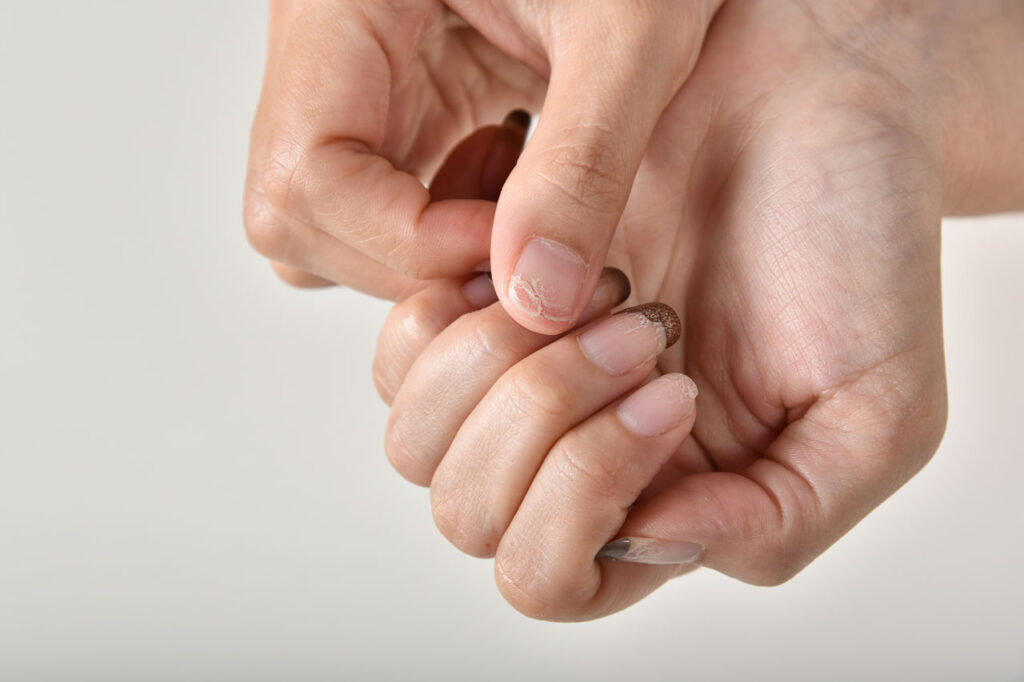
Can I see a dermatologist about my nails? Yes!
Your nails can provide valuable insights into your overall health. When you notice a sudden change in their color, texture, or shape, it’s essential to consult a dermatologist for guidance. While the alteration may be harmless, it could also be an indicator of an underlying issue that may need proper treatment.
If you notice any significant changes in the appearance or texture of your fingernails or toenails, it is advisable to consult Board Certified Dermatologist Dr. Solomon Brickman.
When should I see a dermatologist for my nails?
Fungal infections in the nail
Nail infections are common and they are caused by various fungi that get into your skin and into your nails. Unfortunately, they are very easy to get.
Toenails are particularly susceptible to fungal infections because they often remain enclosed in socks and shoes throughout the day, creating a moist environment that promotes fungal growth. Additional activities increase the risk of toenail infections, such as walking barefoot in warm and damp places like pools or gym locker rooms.
Fingernails exposed to prolonged moisture are also vulnerable to fungal infections. It is also not uncommon for a fungal infection on the foot to spread to the fingernails.
If you are currently with diabetes or a weakened immune system, nail infections are particularly risky. It carries a higher risk of developing non-healing sores. If you are concerned that you have a nail infection, it is strongly recommended you contact Dr. Brickman.
Dark streak under nails
If you notice a new or evolving dark streak on your fingernail or toenail, strongly recommended you schedule a skin cancer screening with a dermatologist. This dark streak could potentially be melanoma, the most severe form of skin cancer. While not every dark streak is indicative of melanoma, you should still take a proactive step and schedule an exam. As with all cancers, early detection and prompt treatment can have an impact on the outcome.
Lifting and detaching nails
If a nail begins to lift to the point where it becomes completely detached, you may be dealing with a severe nail infection and/or the result of injury. A rigorous examination by Dr. Brickman will help identify the cause of your lifting nail and recommend appropriate treatment.
Swelling or discoloration
If you notice the skin around your nails being swollen, or if you notice your nails becoming discolored, you may have a serious infection. Moreover, discoloration may be the result of a fungal infection, smoking, wearing nail polish without a base coat, or the sign of a much more serious disease.
A consultation and examination is urgent because if left untreated, you run the risk of serious complications.
Pitted or dented nails
Dermatologists recognize pitted nails as a sign of a wider disease affecting your body, such as psoriasis, alopecia areata, or eczema (atopic dermatitis). Turning to Dr. Brickman to get the underlying condition resolved may possibly allow your nails to regain a healthier appearance.
Deep grooves or gaps, also known as Beau lines
Lines that run the length of the nail are common, but seeing deep grooves (almost like ditches in your nail) that run the width of the nail is an indication that something stopped it from growing and/or causing it to grow very slowly. Conditions such as fever, stress, or injury can cause nails to stop growing. However, if you don’t have any idea what could be causing this, it is strongly suggested you consult with Dr. Brickman.
Misshaped nails
Clubbed or curved nails, horn nails (onychogryphosis), and spoon-shaped nails (koilonychia), are the results of various causes such as nutrition deficiencies, circulation issues, or other underlying diseases. If you are experiencing misshaped nails, then seeing a dermatologist such as Dr. Brickman can help.
Contact Dr. Brickman about your nail concerns today
For over 40 years, Dr. Solomon Brickman has provided Houstonians with excellent dermatological care. From addressing common nail issues to underlying skin-related diseases and infections that cause nail issues, Dr. Brickman works with every patient to develop a unique treatment plan for your fingernail and toenail concerns. Contact Dr. Brickman for an appointment today!
